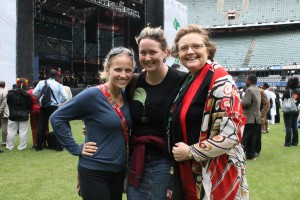Beauty and Struggle in Durban
I arrived in Durban on Saturday as a delegate to the youth conference Youth for Eco-Justice. The program is hosted by the World Council of Churches and the Lutheran World Federation. It brings together youth from around the world who are working on climate justice in their contexts. The first two days have been filled with opportunities to learn about eco-justice in different countries and to look at ways that youth are addressing those concerns.
Despite the hardship of their labour, the lack of fresh water for many of the farmers, and the constant struggle with governments, landowners, and even other community members, many of the people we met took pride in showing us how they feed their families and the spaces they have created within otherwise desperate situations.
It is important to note that the people we met were the fortunate ones who have overcome huge difficulties and been assisted by organizations. Many of the delegates in the youth conference are quick to point out that one major issue for their people is the lack of access to basic means of subsistence; food, water and housing. Add to that high rates of illiteracy, and climate justice is just not on most people’s radar. Many of the townships in South Africa are located in areas that are not the safest environmentally, and yet it is the everyday struggle for survival that occupies most people’s minds and concerns the communities.
For me this brings to mind the issues around the occupy movement. With such wealth and resources, how are governments, corporations and the global community in general not taking responsibility for people’s basic needs? Additionally, how are we in the global north going to ensure that we do not impose idea of how others should view climate justice without knowing their specific contexts?
Yesterday, we began the day with icebreakers to get to know each other better. It was very interesting to see the human map we created of the countries we are all from. Each delegate brings different perspectives and experiences to the group. Although many countries represented do not have widely accessible Internet, all conference participants are on Facebook! The idea that staying connected and communicating with large networks has been widely expressed as a fundamental aspect of movement building.
Sunday afternoon was the inter-faith rally. Although it was widely publicized as an event that would draw tens of thousands, there seemed to be only a few thousand attendees. Never the less, the energy was high as people listened to speeches by such activists as the Arch-Bishop Desmond Tutu and the first female president of Ireland, Mary Robinson. We “occupied” the grass in front of the stage with our posters. We even made the local news!
Archbishop Desmond Tutu noted in his speech that we are all implicated in the fate of mother earth. He laughed his high-pitched contagious laugh while noting that those who are poor may go first, but they will be waiting on the other side for the rich as there we are destroying the earth for all of humanity. As he said “we only have one home.”
In this morning’s Bible study (Romans 8:18-23) we reflected on how the passage relates to humanity, creation and mother earth. In my group, we have the privilege of having two members for whom English is a second (or third) language and this provided the unique opportunity to examine our own ideas of language and the meaning of different words. In verse 21 it notes “that creation itself will be set free from its bondage to decay and will obtain the freedom of the glory of God.” “What is decay?” asked one member of the group. This was very interesting as it brought forth a discussion on how we view decay and the importance of decay in nature and in the life cycle in general and how we as faithful beings have to examine our place in that cycle.
Today we engaged in more in-depth discussion on the different situations in our home countries. I learned about the first youth conference on climate change in Zambia in 2010, deforestation in El Salvador and mono-crops in Argentina, among many others. These were real stories from youth living in these communities and working towards a more sustainable future.
I have been inspired by the faith, energy and dedication these youth have for working towards a different, more sustainable world. From where I stand today, it is hard to think that a different world is not only possible, but also happening.
The overwhelming challenge of fighting for a better future for generations to come is met by fierce passion for eco-justice from all around the world.









